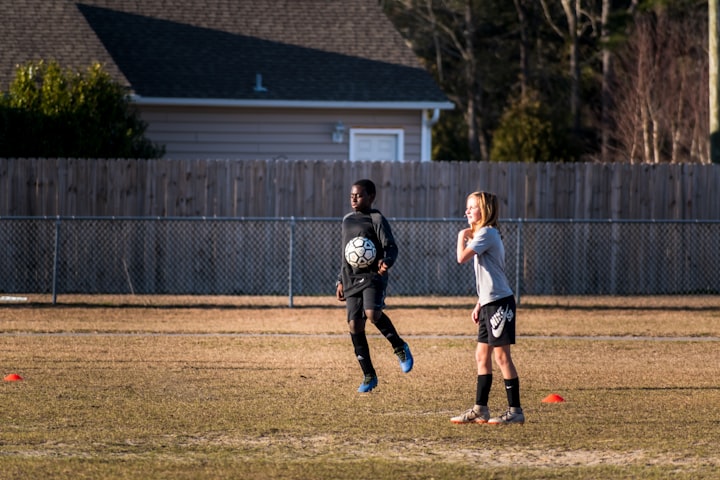5 Signs You May Be a Helicopter Sports Parent
If you're obsessed with making your kid the next superstar athlete, it's time to take a step back and just let them enjoy the experience.

During a youth flag football game, the parents of a 12-year-old boy noticed he was constantly rubbing his right eye.
“What’s wrong?” his mom asked during a timeout.
“My eye hurts,” he said. “I don’t think I can keep playing.”
The boy wasn’t having a particularly good game. His dad thought he was simply looking for an excuse to come out. He began lecturing his son on the importance of perseverance and not quitting just because he wasn’t playing well.
The team won, and was scheduled to play again an hour later. But the boy’s eye was beginning to turn red. During the break between games, his mother insisted they take him to a minor emergency clinic. Sure enough, he had gotten something in his eye that would have caused an infection if it had continued to be overlooked.
That boy was my son. The dad who thought he was teaching a valuable lesson… Yep, it was me. As it turned out, I was the one who needed a life lesson. If we had continued to ignore the redness in his eye, who knows what damage might have been done?
My son is grown now. He didn’t become the next Tom Brady or Peyton Manning. There would be no athletic scholarship to a Division I school or an NFL contract worth millions of dollars.
And you know what? I’m perfectly fine with that.
Don’t get me wrong. I wasn’t intentionally trying to damage my child just to prove a point. But it made me wonder if I was becoming one of those parents living a sports fantasy through their kids.
That experience is one of the reasons I turned to covering youth sports as a journalist. I wanted to make a difference in creating a healthier culture for young athletes.
Here are five types of negative behavior every sports parent should avoid at all costs.
Coaching from the Stands
I’ve talked with dozens of coaches on this subject. One of their biggest issues is being harassed by parents about everything from why their child isn’t playing to questioning game strategy.
According to a survey by
75 percent of youth coaches believe parents place too much emphasis on winning. This is a problem even at the youngest age levels. Kids aren’t concerned with winning championships at age six. Most coaches are putting in a lot of hours and aren’t getting paid a dime. Cut them some slack. If you have an issue with a coach, pull him or her aside privately and talk it out in a mature manner.
Being Abusive Toward Officials
It’s one thing to scream and curse at your television when a baseball umpire or football referee gets a call wrong. But it’s quite a different matter when you do it in person at your child’s game.
According to the
National Federation of High Schools
80 percent of high school sports officials quit after just two years. Most cite verbal and even physical abuse from parents as the main reason. The NFHS sent a stern memo to parents in 2019 telling them to “cool it”. Many youth organizations are having difficulty scheduling games because they don’t have enough officials.
There is simply no excuse for this type of behavior at any level of sports. Like coaches, officials get little or no pay for their hard work, and they all make mistakes. It also sets a poor example for your kids, so “cool it” for their sake.
Excessive Bragging
There’s nothing wrong with being a proud parent. But constantly boasting about how many baskets your child made and posting dozens of pictures on Facebook and Instagram is over the top.
Sports counselor
advises parents to talk up their child’s team, not just him or her. Thank the coaches for their dedication and hard work. It takes an entire team effort to be successful, so give credit to others who are working just as hard.
Criticizing Your Child’s Mistakes
Think of the many professional athletes who drop a pass or strike out in a critical situation. How many times do you see them getting roasted on TV or social media? Your child isn’t getting paid to handle that kind of pressure.
In an article on
one sports mom asks the question, “how would you feel if you came out of a huge presentation at work and had someone immediately going over every sentence?"
Instead, she suggests praising your child’s effort. It’s OK to talk about what they could have done differently, but give them some space. It can wait a few hours or the next day, not on the way home. Your child already knows they made a mistake, so a verbal tongue-lashing from you certainly won’t help.
Risking a Child’s Health to Win
This is what I almost did with my son. He could have had a serious eye problem if his mom hadn’t insisted we get it checked out.
In his book
Mark Hyman recounts how he told his 14-year-old son Ben to pitch despite a sore shoulder. Hyman was coaching Ben’s baseball team, and it was the playoffs. Ben eventually suffered a major arm injury, and Hyman realized he had fallen into the trap of winning at all costs. He wrote the book to help break the cycle of destructive behavior in our youth sports culture.
I believe most parents want the best for their kids, and give them all the support and encouragement they need to achieve success. But if you’re obsessed with turning your kid into the next superstar athlete, it’s time to take a step back and just let them enjoy the experience.
Winning a game or championship isn’t worth damaging a child’s physical and emotional well-being. I’m certainly glad I learned that lesson before it was too late.
About the Creator
Stephen Michael Kerr
Stephen has covered sports as a journalist for over 30 years. His passion for creating a better sports environment for kids led him to devote his full attention to tackling issues facing youth sports. Follow him on Twitter: @smkwriter1






Comments
There are no comments for this story
Be the first to respond and start the conversation.